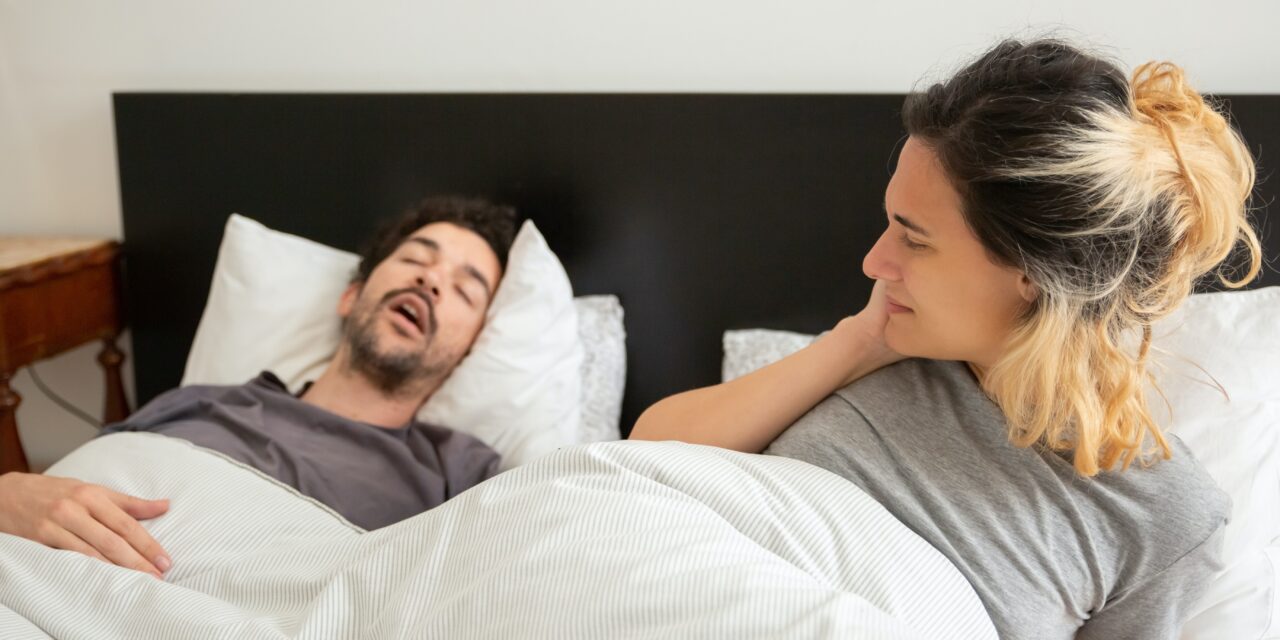For those that don’t already know, snoring is the hoarse or harsh sound that occurs when the air flows past relaxed tissues that are in your throat. This causes the tissues to vibrate when you breathe. The majority of people will snore lightly on occasion, but for others, it can be an indication of an underlying health problem.
If you are someone that snores a lot, you might be left wondering if this is a sign that there is something wrong, and for some people, it can be. Although, you shouldn’t start panicking yet, as it is something that can be completely normal, especially if you only snore occasionally. There are also additional factors that can influence snoring like lifestyle changes, losing weight, and alcohol consumption.
In this article, we are going to tell you if your snoring could be bad, and we are going to look at various different causes of snoring. There are some things that you can try to reduce or stop your snoring before you see a doctor, and we are going to answer all of your snoring-related questions here.
What to expect from our article
What is Snoring?
Snoring is essentially noisy breathing while you are asleep, and it is actually a really common condition that can affect anyone. However, it is more likely to occur in men and people that are overweight. It is also something that can get worse with age.
Is Snoring Bad?
More often than not, snoring every now and then is not going to be bad, and it won’t cause serious problems, other than being annoying for your bed partner. However, if you snore a lot, then this is something that is definitely going to have an impact on your sleep quality.
Snoring can be a symptom of a health problem, like obstructive sleep apnoea, so you should go and talk to your doctor if you are overly tired throughout the day, you snore often or very loudly, or if your partner notices that you stop breathing in your sleep. All of these things combined could indicate that you have obstructive sleep apnoea.
What Causes Snoring?
There are lots of things that can cause snoring, but it occurs when the flow of air through your nose and mouth is blocked. There are quite a few things that can interfere with normal airflow, which we will talk about more below.
Blocked nasal airways – There are some people that will only snore during allergy season, or when they have a sinus infection. Other problems with your nose, like a deviated septum or nasal polyps, can also block your airways.
Poor muscle tone in your throat and tongue – Throat and tongue muscles can become too relaxed, and this can allow them to collapse into your airway.
Bulky throat tissue – This is something that can be caused by being overweight, and some children can have larger tonsils and adenoids that can make them sore.
Long soft palate and/or uvula – This is when the dangling tissue in the back of your mouth narrows the opening from your nose to your throat. So, when you breathe, they will vibrate and come into contact with each other, blocking your airway.
Alcohol and drug use – Both drinking alcohol and taking muscle relaxers can cause your tongue and throat muscles to relax too much.
Your sleeping position – Sleeping on your back can lead to snoring, as well as using a pillow that is either too big or too soft.
Sleep deprivation – It is also possible for your throat muscles to relax too much if you are not getting enough sleep.
Snoring and Obstructive Sleep Apnoea
Snoring is something that takes place when your normal airflow is blocked or restricted, and it can range from light and barely audible to heavy and disruptive. For some people, heavy snoring can be an indication that they have sleep apnoea. This is a breathing disorder that can cause people to choke or gasp for air in their sleep.
Snoring is one of the main symptoms of obstructive sleep apnoea. Interestingly, around 2.9% of adults will live with obstructive sleep apnoea. Episodes that involve a complete loss of airflow, causing you to stop breathing in your sleep, are called apnoeas. On the other hand, episodes with reduced airflow are called hypopneas.
These can occur between 5 and 15 times per hour in those that have mild obstructive sleep apnoea, or between 16 and 30 times in those that have moderate obstructive sleep apnoea. Finally, for people with severe obstructive sleep apnoea, they can occur more than 30 times an hour.
Even mild obstructive sleep apnoea can have a big impact on a person, and the worse it is, the more of a negative impact it will have.
Symptoms of Obstructive Sleep Apnoea
As you now know, snoring is something that is often associated with a sleep disorder that is called obstructive sleep apnoea. If you do snore, it doesn’t automatically mean that you have this condition, but if it is paired with any of the following symptoms, then you may want to speak with your doctor:
- Periods where you stop breathing in your sleep
- Feeling extremely tired in the daytime
- Finding it hard to concentrate
- Getting headaches in the morning
- Having a sore throat when you wake up
- Experiencing restless sleep
- Gasping or choking at night
- High blood pressure
- Chest pain at night
- Loud and disruptive snoring
- Poor attention span and performance or behavioural issues in children
Risk Factors of Obstructive Sleep Apnoea
There are also some things that put you at a higher risk for obstructive sleep apnoea, and it is important to be aware of these things if you think that you may have this condition. Some of the risk factors for obstructive sleep apnoea include:
- Obesity
- Enlarged tonsils or adenoids
- Endocrine disorders
- Hypogonadism
- Genetic syndromes
Diagnosing Snoring
The first step to finding out what is causing your snoring and what needs to be done about it is to visit a doctor. They will be able to provide you with all the help and guidance that you need when it comes to getting a diagnosis.
Your doctor will ask you about your medical history, and they may do a physical exam to look for things that could potentially be blocking your airways. This could be things like chronic nasal congestion due to rhinitis or sinusitis, a deviated septum, or swollen tonsils.
In some instances, they will require some additional tests like imaging tests, an X-ray, an MRI scan, or a CT scan, and all of these things can help to find problems with your airways. You may also be asked to take part in a sleep study, which can sometimes take place within the comfort of your own home.
A sleep study can involve being connected to different monitors while you sleep to measure things like your heart rate, breathing, and brain activity.
Treatment for Snoring
The treatment for your snoring will depend on what is causing it. Your doctor will be able to discuss the best treatment option for you. Some possible causes and treatments for snoring are:
Your tongue is partially blocking the back of your throat – If this is the case, you can wear a device in your mouth called a mandibular advancement device, which will bring your tongue forward.
Your mouth falls open when you sleep – You can get a chin strap that will work to hold your mouth closed. Alternatively, there is a device that you can wear in your mouth called a vestibular shield that will make you breathe through your nose when you are sleeping.
You have blocked or narrow airways in your nose – There are special devices like nasal dilators or strips that will hold your nose open while you are asleep. You can even get sprays that will reduce the swelling inside your nose.
Some other snoring treatments include:
- Changes in lifestyle – Your doctor may advise you to lose weight, quit smoking, or stop drinking alcohol before you go to bed, as these are all things that can cause snoring.
- Oral appliances – You can wear a small plastic device in your mouth while you sleep, which can keep your airways open by moving your jaw or tongue.
- Surgery – There are various different procedures that can help you to stop snoring.
- CPAP – Continuous Positive Airway Pressure therapy can work to treat sleep apnoea, and it can even reduce snoring as it blows air into your airways to keep them open while you are sleeping.
The Risks of Snoring
Sometimes, snoring can be more than just a nuisance, and if your snoring is impacting your ability to sleep, or it is connected to obstructive sleep apnoea, then it can lead to other complications like:
- Feeling exhausted during the day
- Feeling frustrated and angry more than normal
- Finding it difficult to concentrate
- Higher risk for high blood pressure, heart conditions, and a stroke
- Learning difficulties and behavioural problems in children
- An increased risk of driving accidents due to lack of sleep












